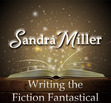Sandra Miller's Blog, page 3
June 29, 2011
Retailer as Publisher -or- How Amazon Took Over the World
 I worry about the future of big traditional publishing houses, I really do. They are behemoths, giant corporate entities owned by giant conglomerates. Change comes slowly, when it comes at all.
I worry about the future of big traditional publishing houses, I really do. They are behemoths, giant corporate entities owned by giant conglomerates. Change comes slowly, when it comes at all.
For decades these groups have had a stranglehold on readers, and therefore also on writers, of books. A kind of monopoly of their own–you couldn't get into the major distribution channels without them, and you couldn't get into bookstores without the distribution channels. Certainly self-publishing, or even vanity publishing, were always options.
They just weren't options that were very likely to succeed.
Along came the POD press. Along came the eBook. On their own, these didn't cause any revolution–eBooks tied you to a computer and were inconvenient. POD books were pricey and of substandard quality. Even when good POD services came along–like Lulu, one of my favorites–their prices were still high enough to make it difficult to be competitive, and the lag time between ordering and receiving a book could cause a customer to drop your book and look elsewhere for more immediate entertainment.
This is all just my view, of course. But I credit Amazon with cracking open the status quo. Amazon and Big Publishing have gone to the mat several times–you may remember their recent squabble over agency pricing.
Big Publishing always regarded eBooks as a passing fad that would never catch on, much like that new-fangled television set. As I recall, when the Kindle first appeared on the scene, most big publishers weren't exactly beating down the door to get their content on the device. I wonder how things might be different now if they had.
Amazon dealt a 1-2 punch combo that has pretty much assured everything must change. They started CreateSpace, and they opened up their Kindle platform to everyone.
CreateSpace, on the surface, seems like just another POD. When I look at CreateSpace, though, I see two distinct advantages–distinct enough that other publishing services have not been able to convince me to switch. First, CreateSpace's pricing models are more competitive than other services I've seen. Especially if you use their Pro Plan. Concerto is over 300 pages, it's in trade paperback format–which falls somewhere between mass market paperback and hardback on the price & quality scale–and it retails for $7.60. Granted, I see about a quarter of that, but I'm totally stoked to be able to get prices that low. I have trade paperbacks from traditional publishers that I've bought in bookstores. Their cover prices are at least double my price. That is, to me, pretty cool.
CreateSpace's second advantage is in your listing on Amazon. If you publish through any other service, your book will show "Usually ships in XX days" next to the price. As a reader, I hate seeing that. I'm spoiled, I'm used to instant gratification, and I hate waiting for things to ship. If I'm going to order it, I'd at least like it to be in stock so it can ship right away.
When you book is done through CreateSpace, it will show up on Amazon as "In Stock, Ready to Ship". That, to me, is a pretty big advantage. As far as price and shipping, I can be on equal footing with big publishing.
Opening up the Kindle to independent content was a huge move–one I'm not sure Big Publishing saw coming. I know I didn't see it coming. Suddenly talented authors could put their work out there on their own, and sell it for $4.99, $2.99, or even $.99–and still make a profit. Big Publishing can't compete on those terms. They have too much overhead.
And now, Amazon has started their own publishing imprints. They have hired big guns to run them, and they are aggressively pursuing books–some of the same ones Big Publishing is after. Their contracts, from what I have heard, are more author-friendly than traditional contracts.
What would it mean for all of us if the next Stephen King, or Nora Roberts, or Dean Koontz novel came to us through an Amazon imprint?
What does this mean for Big Publishing? I don't know. I wish I did. The only thing I'm certain of at this moment is that things are not going to stay the same. With the opening of the Kindle and like devices, Big Publishing cannot compete. So they have two options: face extinction, or change the rules so that they can compete again.
Given the history of publishing, I think I know which one of those options I would bet on. The only question is how successful they will be with their attempt, and I think Amazon will be a large determining factor in that.








June 21, 2011
Pantsing vs Plotting – a more personal view
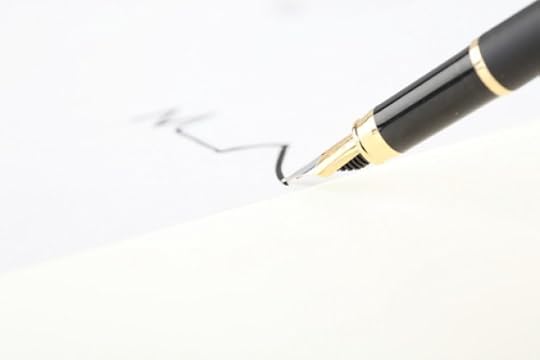 If you've read To Plot or Not To Plot or To Plot or Not To Plot Part II, you have a feel for my general view on plotting vs pantsing.
If you've read To Plot or Not To Plot or To Plot or Not To Plot Part II, you have a feel for my general view on plotting vs pantsing.
However, the reasons I give in those posts tend to be generic arguments that apply to most people, the kind of thing you will probably hear a lot whenever this debate comes up.
Today I'd like to add one more reason I'm in favor of plotting, a more personal reason that may not apply to anyone else in the world but me. :)
First, know that I would pay good money *not* to be a main character in one of my novels. My main characters never have an easy go of it. They lose people they cherish, they get beat down and have to get back up again…and again…and again… I don't know if I have ever written a story that I would actually want to be in.
Second, I get pretty involved when I write. I was working on a scene for The Lost Concerto last night that drove this home to me. This particular event had been planned since before my pen ever touched the paper for the first word of this book. I had known it was coming since the very beginning, no surprises here.
And yet, when I wrote the scene, I got totally worked up. My main character was freaking out, completely losing it over this thing that had happened–and I found that by the time I put my pen down, so was I. Whoever believes writing is easy doesn't write like I do. For my characters to feel anything, I have to feel it first. That can put a person through the wringer.
And that is why I prefer plotting. My characters walk through hell, and that means I have to walk through hell with them. I don't know if I would stick through that, without knowing for certain that in the end there would be a resolution that would make everything worth it. And for me, the best way to be certain is to find that resolution up-front, before I even start writing, and hang on to it like a talisman while I ride the rocket-sled to hell with my characters.
That doesn't always mean the resolution I had in mind will be what actually happens at the end–even with the best plotting, things will change while you're writing. But for me, it serves its purpose–which is getting me through to the end to find out what the resolution really will be.
June 20, 2011
Crystal Cave broke the top 100 in the UK today!

Forgive my enthusiasm, but this is my first trip into the top 100 bestseller lists on Amazon of any flavor.
My novella The Crystal Cave broke into the top 100 bestseller list on Amazon UK today for fantasy short stories.
Amazon Bestsellers Rank: #10,784 Paid in Kindle Store
#62 in Books > Fantasy > Short Stories
If you think I'm happy now, wait until something of mine breaks an Amazon.com bestseller list









June 17, 2011
Announcing the New Arrival
If you hang around here very often, you may have noticed that I sneaked a change into my works in progress list. I hadn't said anything to anyone because I wasn't sure how plausible my new project was–I've been spending a lot of time kicking around ideas and possible plots.
But I've invested enough time in it now, and I've gotten far enough along in the process…and the product I'm seeing developing is solid enough…it's time to formally announce the new arrival I kind of slipped in.
My newest work in progress is…
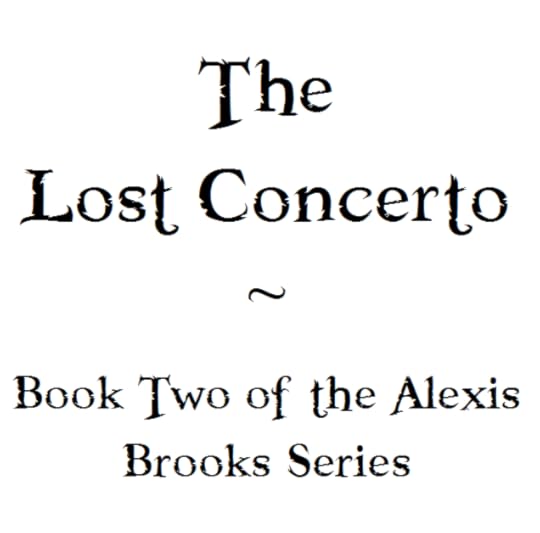 The Lost Concerto follows the continuing adventures of Alexis Brooks and Chrispen Marnett. It takes places almost one year after the end of Concerto. The storyline features more of the same nail-biting suspense that made the first book a favorite with readers.
The Lost Concerto follows the continuing adventures of Alexis Brooks and Chrispen Marnett. It takes places almost one year after the end of Concerto. The storyline features more of the same nail-biting suspense that made the first book a favorite with readers.
To be honest, I did not originally envision Concerto as the beginning of a series. One of the early reviews on Concerto included this line:
Concerto would be a good first book in an ongoing series; it is an easy read that grabs the reader's attention and holds it to the very last page.
At the time, I have to admit, I focused more on the grabbing attention and holding it to the last page part–that seemed to me pretty high praise for a suspense novel, or any novel, for that matter. Besides, how could Concerto possibly be part of a series? The story was done, right?
That line was a great blurb quote, the kind of thing you use all over the place. And the more I saw it, the more that bit about a series stuck in my mind. It took me a while to decide to seriously think about it, and see what I could come up with. I never planned it to be a series, but I adore the characters. The chance to write more about them was too good to pass up.
And the story that had developed–and is still developing–out of all of this is good. I can't wait to find out if readers agree.








June 16, 2011
Telegraphing to Your Reader -or- How to Shout Without Making a Sound
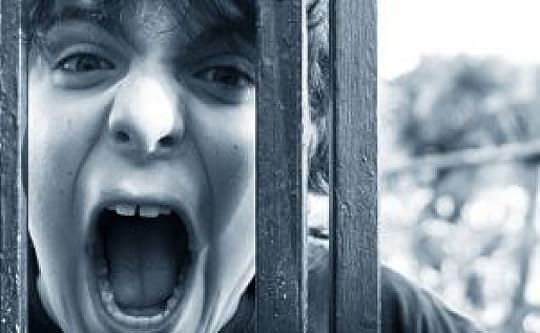
Have you read the kind of book where there are two men in the storyline; one who was a bit shady or aggressive or otherwise off-putting, and one who seemed totally awesomely perfect?
And at the end the totally awesomely perfect fellow turned out to be the twisted psychopath we were looking for all along?
I have to admit I sort of hated that. I never really liked getting attached to a really cool character, only to find out that they were never really cool to begin with.
So I was actually inclined to be pleased when one of my readers commented that she knew from very early on who the twisted psychopath was in my novel Concerto. It was done that way deliberately. Today I'm going to talk a little bit about how.
It's also going to be a bit spoiler-ish, so if you're thinking about reading Concerto and don't want any hint of what's going to happen before you read it, you probably don't want to continue.
All set? Okay. Here we go.
There are two main male characters in Concerto. One is Alexis Brooks, and one is Dwight Richards. Our protagonist does not know a whole lot about either of these characters when they are first introduced. But I wanted the reader to be able to get a feel for them right away, and what type of role they might play going forward. Then through the first half of the story, I'm going to test that instinct, because neither of them immediately seem to conform to the impression the reader generated. The trick, though, is to get the reader to generate the proper impressions up front.
How do you do that? There are lots of ways. Let's look at the ones I used. First, let's look at the very first appearance of Alexis Brooks. Our protagonist is in the concert hall's Green Room–presumably alone, until she hears voices approaching down a nearby hall.
Nobody was likely to be in the Green Room restrooms at six-thirty in the morning. It had to be the conductor then–Darren Johnson must have been having a meeting.
"I'm sorry, Darren, I cannot discuss this any further."
Well, now I knew who Darren was meeting so early. That particular voice always made my knees a little weak. Alexis Brooks, international superstar, accused murderer, and concertmaster of the Newton Philharmonic Symphony Orchestra.
And an ongoing fangirl crush of mine since I was sixteen, but I was pretty sure this was not a good time to be thinking about that. The voices were getting louder now, and I was about to be involved in a confrontation between the conductor and the concertmaster of the symphony I worked for.
Not a pretty place to be. Pacing the house was not looking so bad right now.
"Alexis, stop." I couldn't tell if Darren was trying to plead or command. "You aren't being reasonable, you have to see that."
"I don't care, I–" Alexis came around the corner and stopped short, staring at me. I could feel my face start burning. Terrific.
I tried to think of something to say to him, anything that wouldn't make me look like a psycho eavesdropper. But I was drawing a total blank, and so I was still standing there like a red-faced idiot when Darren came barreling around the corner after Alexis and nearly ran right into him.
Okay. Now gather your impressions from that, but before we discuss it, let's take a look at the first entrance of Dwight Richards.
A few minutes later, Dwight Richards came in. For some reason I couldn't quite put my finger on, I always felt tense when he was around. Dwight was the symphony's principal second violinist. He was dark-haired and dark-eyed and really a handsome man. He'd been asking me out pretty consistently since I came to town six months ago, but I just couldn't feel comfortable enough around him to say yes. We were pretty good friends though. He dumped his violin case in a chair, stretched, looked around, and saw me.
Uh-oh. I knew that look, and I didn't feel like having the same conversation, ending with the same no, this early this morning. I picked up my styrofoam coffee cup and headed for the sink farther down the counter, hoping to discourage him.
No such luck. "And how is Ms. Assistant-Concertmaster today?" demanded a cheerful, deep voice at my shoulder as I turned the water on.
"Oh, you know, could be better, could be worse," I said evasively, rinsing the cup and lid. "I didn't sleep well. But I'm still here, which is a plus. And you?"
He didn't answer. He stood there silently at my shoulder until I threw away the cup and turned around, and I saw he was frowning.
"What?" His scrutiny unnerved me. I looked away and saw principal violist Daniella Lewis walk in, scowl at us, and cross the room to sit down.
"I knew it," he said quietly. "You look terrible. What happened?"
I sighed. I didn't really want to talk about this with Dwight–he was insanely jealous of Alexis Brooks. Just the mention of our concertmaster's name could sour a conversation. But it wasn't like this one had been going so well anyway. "There was some excitement this morning. Alexis was pretty upset. But I think it all worked out alright in the end–it sounds like you're going to play the Bach Double with him next week. Pretty cool, right?"
Dwight didn't appear to think so. He stared at me a moment longer, like he was trying to hear everything I hadn't said. "That's it? Our high-and-mighty concertmaster was upset?" He paused. "And that upset you?"
"Well, he sounded to me like he might leave the symphony for awhile there."
Dwight snorted. "And that would be a Terrible, Bad Thing, right?" He looked like he was thinking about stomping off. "Look, there was a Newton Philharmonic Symphony Orchestra before Alexis Brooks came here. I'm sure we'd survive if he left."
I shook my head. "It wasn't the same, Dwight. You were here before Alexis came, you must know that. I just got here six months ago and I can tell. Newton's too small a town, and the symphony is too new to compete with the big East Coast orchestras. You'd never get the talent you have now without him. People don't go to Juilliard to play in little mid-west symphonies."
"People don't…wait, Ms. I-Went-To-Juilliard, why did you move out here, then?"
I could feel my face turn red. "For the opportunity to work with Alexis Brooks, of course. The greatest violinist of our age–some say the greatest violinist who ever lived. And I get to share the first stand of the symphony with him. I'd have to be crazy to pass that up, right?"
Dwight was staring at me like I was sprouting horns. "And the fact that he was the prime suspect in his wife's murder–that he stood trial for it, and only got off on a technicality–that doesn't bother you at all?"
There now. We've officially met both of our main male characters. And I'm betting you could tell from a mile away that Alexis is awesome and Dwight is trouble, right?
First, Alexis. I'm not quite as blunt with his introduction as I am with Dwight's, but the signals are still there. Chrispen is attracted to Alexis, which is evident in the "ongoing fangirl crush" line, and her remark about his voice. Also, you'll notice the nervous way she jumps out of her chair when she hears him coming, the blushing and the blank mind. We learn more from her reactions to him than from anything she says. Because of her attraction to him, we are sympathetic to him, even with "accused murderer" thrown in there.
Now that we get to it, that's quite a line. "Alexis Brooks, international superstar, accused murderer, and concertmaster of the Newton Philharmonic Symphony Orchestra." I've just introduced a character, using not only his first and last name, but three different subtitles, and a couple of adjectives. Why does that matter? Because whether I meant to or not, I just made a promise to you. I just drew your attention to this character, highlighted him in a way you could not ignore. Lots of people come in and out of a storyline, without a red carpet like that rolled in front of them.
I just promised you that this character is important. He'd better turn out to be important, too, because readers do not like it when you make promises you don't keep.
What about Dwight? If I did my job right, he gives you a bad taste in your mouth the first time you meet him. Why?
Dwight does a lot of things that, in combination, are very off-putting. He invades Chrispen's personal space. He's pushy. He gives people disparaging nicknames.
I also use a bit of dialog to establish that what Dwight says can't always be trusted. In this scene, he tells Chrispen that Alexis got off on a technicality. Later on, we will discover that there was a mistrial, declared for prosecutorial misconduct. The prosecution had falsified evidence. Most people would probably not summarize falsified evidence as a technicality–we've learned that Dwight will skew things to make Alexis appear as bad as possible.
But the cincher–the one thing about Dwight's introduction that raises the red flag high into the wind, the one line that sums up this character more than any other–is this one:
For some reason I couldn't quite put my finger on, I always felt tense when he was around.
She just said it all. It's obvious she feels bad about feeling this way; she spends the rest of the paragraph trying to soften her own unconscious judgment of him, telling us how good-looking he is and what friends they are. It doesn't matter. We've already heard the truth.
These are the kinds of ways you can give your readers impressions about your characters–even if your viewpoint character doesn't necessarily share the impression. The kind of stories I started off talking about use these signals too, and use them very, very well. The difference is that those stories build these kinds of impressions in order to turn them around. I use them to follow through on at the end, after spending some story time challenging them. We feel Dwight is a jerk, but for the most part, he does not behave that way in the first half of the story. How strongly do we believe our first impression of him? Will we hold on to it through the first half, or will we be shocked when it turns out to be true? We feel Alexis to be a good guy, but how strongly will we hold on to that when everyone in the story world is telling us the opposite?
Either approach is valid. Just be sure you know up front which your is, and that you are telegraphing the signals you mean to send.








June 11, 2011
Author Interview
Just a quick note today, to let you all know that Indie eBooks is featuring my book Concerto today, along with my first Author Interview.
I hope you'll come by and check it out!








June 7, 2011
Agent as Publisher
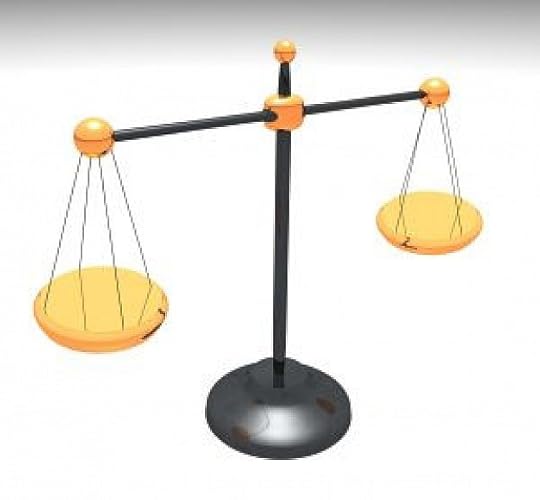
Last time I mentioned in passing that some agents are setting themselves up as publishers. I also mentioned the term "conflict of interest." You may have gathered that I have some problems with this development.
Here's why.
Let's think about the agents original purpose. You hire an agent for a single purpose, really: to be your advocate to publishers. Your agent should back your work to editors at publishing houses. Your agent should negotiate the best possible deal for you when the manuscript is picked up.
Now, how can my agent negotiate the best deal for me with a publisher, if he is a publisher himself? Do you see the conflict of interest here? Every manuscript that crosses his desk is potential money for his publishing arm. If he sells that manuscript to a big publisher, that's money he won't make–even if the deal from the big publisher is better for you. This conflict is always there, even if the agent tries very hard not to let his publishing business interfere with his agenting business. I'm no lawyer, but I don't believe that it's very ethical for a person who has a publishing business to hire on to represent you to publishers.
So let's put that aside for a moment. Forgetting the conflict of interest, why am I uncomfortable with an agent as my publisher, even if I have no desire to shop my manuscript around to the big publishers?
This is a little more technical. And there will be those who will disagree with me, which is fine. All I ask is that everybody consider all of their options, and possible repercussions, before signing anything. As always 
First, I don't believe an agent as publisher is going to offer me anything I can't do for myself. And I'm going to lose some things by going with this arrangement.
If I hire an agent to be my publisher, he's going to take my manuscript, and format it for Kindle, Nook, and Smashwords (if he's good; some of these guys only put it up on Kindle.) Also, he may take it to CreateSpace or Lulu and make a paperback version available. He'll probably hire an artist for a flat fee to create a cover.
There's nothing there I can't do myself. And nothing you can't do yourself, either, even if you've never done any of those things before. Is it worth giving someone a cut–sometimes a large cut–of your royalties to avoid learning these things?
I'll also have to sign a contract with the agent/publisher. And from the rumblings around the internet right now, that contract might have some really scary provisions in it that will make sure my grandkids are giving that agent's grandkids a cut of any royalties those books are still making. And considering Amazon is set up for a long-tail sales approach–it's something to think about.
Another thing that concerns me is this: if my agent uploads my work as my publisher, my work will be under his account at Amazon, CreateSpace, PubIt, Smashwords, and anywhere else he places it. I won't have access to set pricing, create coupons or special promotions, or change up any descriptive text. I can't add editorial reviews as they come in. (Technically, through Amazon's Author Central, I could change text and add reviews–though Amazon warns this may cause problems if my publisher wants to change things later. And I still can't set pricing info, even through Author Central.)
This also means that my agent will have access to sales numbers on my books–but I won't. I will have to accept on blind faith that the numbers he reports to me are accurate. Some agents are honest, and will always reports everything accurately.
Some are not.
And I have no way to tell the difference, or to verify the numbers I am given.
To me, this is a big problem. I realize this is pretty much the way big publishing has done business for decades–authors don't usually have access to raw sales numbers. They get their royalty statements, and they have to trust that the numbers on those statements are correct, or request expensive audits if they suspect a problem. Occasionally, those audits turned up problems.
But now, with the reporting mechanisms in place online, you have the option of seeing your raw sales numbers. Unless your agent loads your work through his account. And in this model, you don't even have the option of an expensive audit.
I know this new service agents are offering has been tempting to many authors, especially those with a large backlist they would like to offer electronically. But before you commit to that path, make sure your gains outweigh your losses.








June 6, 2011
Publishing: Traditional vs Indie -or- House of Cards
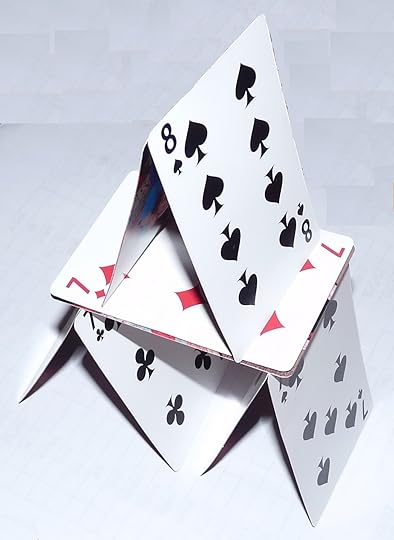
"If there's sharks in the water,
Don't swim where it's deep,
For the taste of success
Can be bitter, and sweet."
–House of Cards, Elton John & Bernie Taupin
Batten down the hatches, folks, this time I'm sticking a toe into water I have deliberately steered clear of for a long time. There be sharks here, mateys.
I'm not even sure where to start. I suppose everything started with an author interview I did recently. One of the questions–a question I'm seeing more and more of–is, why did you choose to self-publish?
I don't usually talk about that much. It can be a contentious subject. But I've read some rather alarming things on some very reliable blogs lately, and I don't feel comfortable keeping silent any more. I run a website for writers, and the people using my website are the very people who could easily run into trouble if I don't help point out the rough waters ahead.
"Traditional publishing" is not a term used much outside the self-publishing (or indie publishing, as has become popular to call it) industry. Once upon a time, the term was invented by vanity presses seeking to downplay the role of the dominant publishing model. These days, the term has been adopted by those who choose to self-publish. Traditional publishing merely refers to publishing as we all learned it–go out and land yourself an agent, who'll represent your work to a publisher, who will polish it up, package it, and get it into bookstores, which until very recently was the only venue in which to make money selling your books.
If you've been around my website much, you'll notice I don't talk much about that side of writing. There are no tips on how to land an agent, no articles on crafting compelling queries. It's a rather glaring omission. It's also deliberate.
I don't have any experience with agents. I query my magazine editors, but I have never worked with a big publishing house. I made a decision not to move in that direction, and not to encourage others, by the content of my website, to move that direction either.
It seems to me that the writing has been on the wall for traditional publishing as we have known it for quite a few years now. Big-box chain bookstores, Amazon, and the practice of "ordering to the net" have gutted the midlist, where it used to be possible to earn a comfortable living, even without ever breaking out into bestseller territory. And this was before the rise of the eReaders, and the shift of the market towards eBooks that progressed–and is progressing–orders of magnitude faster than anybody expected. Amazon tells us that Kindle books are outselling paperbacks and hardbacks combined–for every 100 paper books that are sold, 105 Kindle books are sold.
You may have noticed that big publishers can't compete with independent authors in the eBook arena. Independents can sell their books for $2.99, $1.99, or even $.99, and still make money. A big publisher still has all of their usual overhead to make up–especially with big bookstores going bankrupt and paper copy sales dropping–and they can't meet those expenses with that type of pricing. Big publishers are fighting tooth and nail for higher prices, and for control of prices, and this is why, I think. As more of the market shifts to eBooks, and market forces push towards the lower range prices, big publishers will have to make some pretty dramatic changes to remain profitable.
This is not to say that you can't pitch a book to a big publisher through an agent right now, and close a deal. Of course you can.
So, if I had the Music Mage series completely finished and edited and ready to go out tomorrow, what would I do?
Boy, that's a tricky question. But right at this very moment, I think I would self-publish it. I would hire any work I needed done at a flat fee (not a percentage of my royalties!) and publish the finished product myself.
Why?
I'm hearing some scary things happening out there, folks. Blatant rights-grabs in publishing contracts that used to be safe, agents setting themselves up as publishers (can you say conflict of interest?) and agency agreements with truly terrifying clauses in them.
There are sharks in the water, guys, water that used to be safe. The industry is in flux, and everybody is searching for their place in it as the changes continue. It's a chain of people set up to make their living off of the content writers generate, and it's feeling kind of unstable these days. The house of cards analogy might not be far off.
Not to say there aren't opportunities out there. There are. But you want to be careful. Get yourself an IP attorney, and watch your step. Content is king, as they say, and there will always be a place for a writer, because there will always be people who want to read.
Just make sure you know what place you're being offered before you sign anything. That advice was good twenty years ago, and ten years ago, and it'll be good next year as well. For almost all other advice about the business side of writing–I would be checking the expiration date.








May 29, 2011
Dream Sequences and Formatting

If you're like most writers I know, making your words look pretty on the page is kind of an obsession of yours. Formatting text so that it looks nice is a habit of yours, sometimes a rather time-consuming habit. There are times when you even take formatting to a whole new level, using it to highlight or emphasize artistic choices you have made in your text.
If you are a self-published author, formatting is a whole new can of worms, because you have final control over how your books look, on the inside as well as the outside. It's liberating, but it's also a double-edged sword, because formatting done badly can turn a reader off a book pretty quickly.
One thing that tends to turn up fairly often in my work is dream sequences. Dreams are fascinating, and can be one way to introduce almost paranormal elements into work that isn't actually paranormal.
Two of my currently available works, Concerto and The Crystal Cave, both feature dream sequences. The dream sequences are important, even necessary, to the story. One problem we face as writers, is how to make a dream sequence apparent as a dream. One way I chose to do this is with formatting.
In The Crystal Cave, one of the first scenes is a story-changing dream sequence. To help indicate to the reader that something different was going on here, I used a combination of formatting and tense change. Crystal Cave is told in past tense. But for the dream sequence, the narrative changes to present tense. We experience the dream as it happens, in real time.
But just the sudden change to present tense would, I felt, be confusing. To set the text apart from the rest, I also chose to italicize the dream sequence. Are there rules about this sort of thing? Not that I am aware of. But I think the finished product works well, and it is immediately apparent where the dream begins, and where ordinary reality resumes.
In Concerto, on the other hand, there is no special formatting, no tense change, to alert us to the dream sequence. It's a different situation there, and resulted in a different approach.
Concerto opens with a dream sequence. Now I personally hate it when a narrative begins with a dream and sucks you in, before letting you know several pages later that, oh, by the way, none of that was real. It feels like a trick, and it gets you invested in situations that turn out to be false. I was in a quandry–the nightmare was important, crucial, to the story, and it had to be the opening. On the other hand, the last thing I wanted was to trick my readers. How could I open with a dream without it coming across as a trick?
First, I used my chapter headings. Concerto has a very few chapters, and they are named after the parts of a classical concerto. But each chapter also has a subheading. So I used the subheading of the opening chapter to indicate that this was a dream sequence. My chapters:
Ritornello: The Nightmare
Movement One: The Nightmare Continues
Movement Two: On the Trail of a Madman
Movement Three: Prelude to Destruction
Finale
Second, I changed my opening line. Instead of opening in the action of the dream, I opened with "The dream was always the same." The opening line tells you, straight up, that the sequence you are about to read is a dream.
Are there other solutions to these problems? Of course–there will be as many answers as there are writers. The important thing is that, at some point in the process, we all take a step back and look at our stories as the readers will see them, and consider how we might make the journey easier for them.








May 19, 2011
Lucky Stars, Thank You! -or- The Value of Being an Old Fogey

I know we've all heard about the importance of regular backups. And of hitting "Save" regularly in your word processor while you are working.
Today, I'd like to pop in and remind you that those things don't always save you. Backups can corrupt. A file can appear to save, but actually not commit.
Ask me how I know. Let's say, for example, that I have a sub-notebook that I use exclusively for writing. And let's say this notebook never really gets shut down–I just close it and put it to sleep when I'm not writing.
And say further, that the universe decides to align against me one day. So that, for some strange reason, when I click Save, my work appears to save, but actually…nothing happens. If I had known to check, I would have seen that the file modified date was old. But who thinks to look? After all, why wouldn't it save, unless the universe randomly decided to align against me?
So let's say after I think I have saved, I close my laptop, and plug in it to charge. Only for some strange reason, though it is plugged in, it is not actually charging. For no apparent reason, because both the laptop and the charger are fine. The outlet is fine, too. But the laptop fails to charge.
In this scenario, my laptop would have lost power about 3:14 this morning. It would have done a critical battery save-state thing it does, and then made the Windows 7 shut-down chime that woke me up.
Only, the save state thing didn't work out either. All of my writing from yesterday was lost. The document my computer presented to me today was from two days ago.
This kind of loss can make me shelve a story for weeks, or months–because I'm always sure whatever I write now won't be as good as the material that was lost. Fortunately for me, though, no words were actually lost in this case. Why not?
Because my lucky stars were watching out for me. And I'm an old fogey who likes to write longhand. (Is 38 old? I've got to tell you, most of the time, it feels like it is. :) )
In the recent heavy rains we had, our driveway, which is steep and downhill and gravel/dirt, washed out pretty badly. The gravel that is left is large and loose. And yesterday when I walked down to get the mail, I fell on the loose gravel. I managed to land with most of my weight on my left hand, and centered under the heel of my hand was a rock. So my left hand swelled up and turned frightening colors, and became pretty well useless for typing.
So I broke out the paper and pens, and copied down the writing I had already done, and finished yesterday's writing longhand. I did it to save my hand any further pain, and I copied all the new material so that I would have it handy for reference as I was working. I wasn't planning on that longhand copy saving my butt, but it did.
Thank you, lucky stars!
Is there a moral here? Probably. We should probably be checking the document modified date after we save a file. We should probably be regularly printing out hard copy of new material, so that the entire work is backed up in physical form. The problem is that those things are a pain, they intrude on time we would rather spend writing, and we tend to just not do them.
But as for me, I intend to start.

















